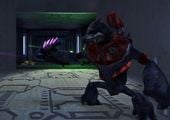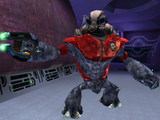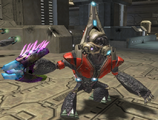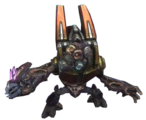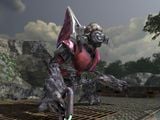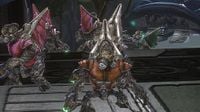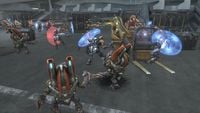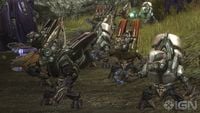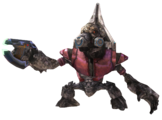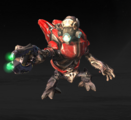Unggoy Major: Difference between revisions
From Halopedia, the Halo wiki
No edit summary |
m (Changed 'Grunt' to 'Unggoy') |
||
| Line 23: | Line 23: | ||
==Background== | ==Background== | ||
===Role=== | ===Role=== | ||
Unggoy Majors are higher in rank than [[Unggoy Minor|Minors]] and are slightly more powerful than their lesser counterparts in terms of strength, intelligence, leadership, and morale. They often lead | Unggoy Majors are higher in rank than [[Unggoy Minor|Minors]] and are slightly more powerful than their lesser counterparts in terms of strength, intelligence, leadership, and morale. They often lead Unggoy Minors in battle, and sometimes entire [[lance]]s when no higher caste species are present. However, even these higher-ranked Unggoy hold no power over any other forces in [[Covenant]] society, save for, occasionally, [[Yanme'e Minor]]s. | ||
===Appearances=== | ===Appearances=== | ||
Unggoy Majors mostly appear leading a squad of Unggoy Minors under the leadership of any [[Sangheili]], even a [[Sangheili Minor|Minor]]. They usually appear wherever Unggoy Minors do. They are found in almost all the levels in the [[Halo|''Halo'' games]] where Covenant forces are encountered. In ''[[Halo 3]]'', not much changes for Unggoy Majors, as they are still lead by the lowest ranks of the highest Covenant society, which at this time are the Jiralhanae. They are usually led by [[Jiralhanae Minor]]s to [[Jiralhanae Captain Ultra]]s. They also fight alongside [[Yanme'e]], [[Kig-Yar]] and even [[Mgalekgolo]] on occasion. In ''[[Halo: Reach]]'', Majors' methane tanks are distinctly shaped like dual columns. | |||
===Description=== | ===Description=== | ||
They are seen in combat as decorated in lucid red-colored armor (similar to their [[Sangheili Major| | They are seen in combat as decorated in lucid red-colored armor (similar to their [[Sangheili Major|Sangheili counterparts]]), contrary to the orange armor of Unggoy Minors. They are more courageous as well, often staying to fight under conditions that would make their lesser brethren flee. If all of their commanders, [[Sangheili]] or [[Jiralhanae]], are killed, they will sometimes continue to fight. However, they still aren't very courageous and can more often be observed fleeing along with Unggoy Minors, though they are more likely to go kamikaze than the Minors. They usually fight alongside a combined team of other Unggoy and Kig-Yar, and have command over the former. Unggoy Majors are the first enemy to wield the hand-held [[Type-33 Light Anti-Armor Weapon|fuel rod gun]] in the Halo series. They were first seen utilizing these deadly weapons after the player had destroyed the first [[Pulse Generator]] in the ''[[Halo: Combat Evolved]]'' level, [[Two Betrayals]]. They also know to use [[equipment]] on occasion.<ref>''[[Halo: The Flood]]''</ref> | ||
== Deployment == | == Deployment == | ||
During combat, Majors are usually the first ones to jump out of the [[Type-52 Phantom]]s. They are known to combine their forces in battle often. The Majors will also pair up and fight together with numerous subordinate Unggoy and even Kig-Yar or Yanme'e soldiers. | During combat, Majors are usually the first ones to jump out of the [[Type-52 Troop Carrier|Phantom]]s. They are known to combine their forces in battle often. The Majors will also pair up and fight together with numerous subordinate Unggoy and even Kig-Yar or Yanme'e soldiers. | ||
== Combat == | == Combat == | ||
Unggoy Majors are only ''slightly'' stronger than their lesser brothers, and are easily taken down with a headshot. In ''Halo: Combat Evolved'', Majors could be taken out with a single headshot or a couple of body shots. In ''Halo 3'', they are stronger and may require two body shots on [[Heroic]] and [[Legendary]]. | |||
Sometimes | Sometimes Unggoy Minors will still fight even if the Sangheili or Jiralhanae leading them is dead, if an Unggoy Major is nearby, though this is very uncommon. The Majors will sometimes be seen leading a small pack of Unggoy Minors by themselves, but this is rare as well. The presence of Unggoy Majors seems to improve the Minors' accuracy slightly in ''Halo 3'' (possibly because of the stern and almost fierce new influence the Jiralhanae have over the Unggoy). Unggoy Majors also throw [[Type-1 Antipersonnel Grenade|plasma grenade]]s more often than Minors. | ||
==Gallery== | ==Gallery== | ||
| Line 45: | Line 45: | ||
File:HCEA-GruntMajor-crop.png|An Unggoy Major in ''Halo: Combat Evolved Anniversary''. | File:HCEA-GruntMajor-crop.png|An Unggoy Major in ''Halo: Combat Evolved Anniversary''. | ||
File:H2-GruntMajor.png|An Unggoy Major in ''Halo 2''. | File:H2-GruntMajor.png|An Unggoy Major in ''Halo 2''. | ||
File:Grunt.png|An Unggoy Major from ''Halo: Reach'' wielding a Needler. | File:Grunt.png|An Unggoy Major from ''Halo: Reach'' wielding a [[Type-33 Guided Munitions Launcher|Needler]]. | ||
File:GruntMajor01.jpg|An Unggoy Major on [[High Charity]]. Note the black skin and eyes, less reflective armor, and a helmet. | File:GruntMajor01.jpg|An Unggoy Major on [[High Charity]]. Note the black skin and eyes, less reflective armor, and a helmet. | ||
File:Grunt Major 2.jpg|An alerted Major stands ready near [[Voi]], [[Kenya]], with a standard plasma pistol. | File:Grunt Major 2.jpg|An alerted Major stands ready near [[Voi]], [[Kenya]], with a standard [[Type-25 Directed Energy Pistol|plasma pistol]]. | ||
File:Grunts Pack.jpg|A group of | File:Grunts Pack.jpg|A group of Unggoy including four Majors, an [[Unggoy Heavy]], an [[Unggoy Minor]] and an [[Unggoy Ultra]]. | ||
File:4 Grunts.jpg|A group of [[Unggoy Minor | File:4 Grunts.jpg|A group of [[Unggoy Minor]]s are lead by a Major. | ||
File:Forkpocalypse.jpg|Unggoy Majors as they appear in ''[[Halo: Reach]]'' | File:Forkpocalypse.jpg|Unggoy Majors as they appear in ''[[Halo: Reach]]'' | ||
File:Halo-reach-20100722115108524_640w.jpg|A column of Unggoy in ''Halo: Reach''. | File:Halo-reach-20100722115108524_640w.jpg|A column of Unggoy in ''Halo: Reach''. | ||
Revision as of 04:56, January 21, 2015
| Major | |
|---|---|
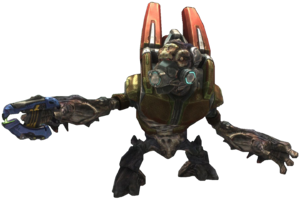
| |
|
Function: |
Infantryman |
|
Species: |
|
|
Affiliation: |
|
Unggoy Major is a common Unggoy rank in the Covenant military.[1][2][3]
Background
Role
Unggoy Majors are higher in rank than Minors and are slightly more powerful than their lesser counterparts in terms of strength, intelligence, leadership, and morale. They often lead Unggoy Minors in battle, and sometimes entire lances when no higher caste species are present. However, even these higher-ranked Unggoy hold no power over any other forces in Covenant society, save for, occasionally, Yanme'e Minors.
Appearances
Unggoy Majors mostly appear leading a squad of Unggoy Minors under the leadership of any Sangheili, even a Minor. They usually appear wherever Unggoy Minors do. They are found in almost all the levels in the Halo games where Covenant forces are encountered. In Halo 3, not much changes for Unggoy Majors, as they are still lead by the lowest ranks of the highest Covenant society, which at this time are the Jiralhanae. They are usually led by Jiralhanae Minors to Jiralhanae Captain Ultras. They also fight alongside Yanme'e, Kig-Yar and even Mgalekgolo on occasion. In Halo: Reach, Majors' methane tanks are distinctly shaped like dual columns.
Description
They are seen in combat as decorated in lucid red-colored armor (similar to their Sangheili counterparts), contrary to the orange armor of Unggoy Minors. They are more courageous as well, often staying to fight under conditions that would make their lesser brethren flee. If all of their commanders, Sangheili or Jiralhanae, are killed, they will sometimes continue to fight. However, they still aren't very courageous and can more often be observed fleeing along with Unggoy Minors, though they are more likely to go kamikaze than the Minors. They usually fight alongside a combined team of other Unggoy and Kig-Yar, and have command over the former. Unggoy Majors are the first enemy to wield the hand-held fuel rod gun in the Halo series. They were first seen utilizing these deadly weapons after the player had destroyed the first Pulse Generator in the Halo: Combat Evolved level, Two Betrayals. They also know to use equipment on occasion.[4]
Deployment
During combat, Majors are usually the first ones to jump out of the Phantoms. They are known to combine their forces in battle often. The Majors will also pair up and fight together with numerous subordinate Unggoy and even Kig-Yar or Yanme'e soldiers.
Combat
Unggoy Majors are only slightly stronger than their lesser brothers, and are easily taken down with a headshot. In Halo: Combat Evolved, Majors could be taken out with a single headshot or a couple of body shots. In Halo 3, they are stronger and may require two body shots on Heroic and Legendary.
Sometimes Unggoy Minors will still fight even if the Sangheili or Jiralhanae leading them is dead, if an Unggoy Major is nearby, though this is very uncommon. The Majors will sometimes be seen leading a small pack of Unggoy Minors by themselves, but this is rare as well. The presence of Unggoy Majors seems to improve the Minors' accuracy slightly in Halo 3 (possibly because of the stern and almost fierce new influence the Jiralhanae have over the Unggoy). Unggoy Majors also throw plasma grenades more often than Minors.
Gallery
An Unggoy Major within Halo: Combat Evolved.
An Unggoy Major from Halo: Reach wielding a Needler.
An Unggoy Major on High Charity. Note the black skin and eyes, less reflective armor, and a helmet.
An alerted Major stands ready near Voi, Kenya, with a standard plasma pistol.
A group of Unggoy including four Majors, an Unggoy Heavy, an Unggoy Minor and an Unggoy Ultra.
- 4 Grunts.jpg
A group of Unggoy Minors are lead by a Major.
Unggoy Majors as they appear in Halo: Reach
A render of a Unggoy Major as it appears in Halo 3.
An Unggoy Major in Halo Combat Evolved Anniversary.
List of appearances
- Halo: The Fall of Reach (First appearance)
- Halo: Combat Evolved
- Halo: The Flood
- Halo: First Strike
- Halo 2
- Halo Graphic Novel
- Halo: Ghosts of Onyx
- Halo: Uprising
- Halo 3
- Halo 3: ODST
- Halo Legends
- Halo: Reach
- Halo: Combat Evolved Anniversary
- Halo: Spartan Assault
- Halo: Escalation
- Halo 2 Anniversary
Sources
| ||||||||||||||
